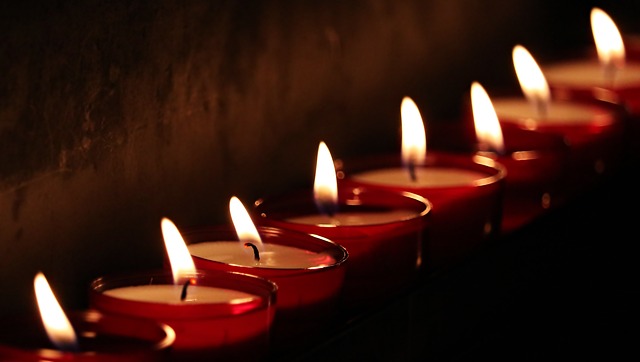
By Dr. Michelle Reyes | Twitter: @dr_reyes2
I could see the frustration and heartache all over her face.
The woman standing before me had just heard that the Deferred Action for Childhood Arrivals (DACA) Program was ending, and she was now terrified for her future in the only country she had known as home since being a young girl.
Tears flowed down both of our faces as I could only stand there and weep with her.
What was this woman to do?
Her story is a tragic one and, sadly, not so uncommon. Born in Guatemala, she had been kidnapped from her own home at age seven by human traffickers, and the stories she recounts from that time in her life are truly horrific. It was only by God’s grace that she was able to escape. During a chaotic moment, while her kidnappers were stationed near the Mexican-American border, she made a run for it. This woman ran so hard for so long that she eventually passed out, and when she awoke she found herself on the side of a Texas highway. She didn’t even realize she had crossed into the U.S. She had just been trying to run back home! A kind, old woman took her in, brought her back to health and raised her as an adopted daughter.
As the pastor’s wife of an urban, multicultural church in Austin, TX, this was not the first story of its kind that I had heard. Our church is a minority church, and it is comprised of immigrants, refugees and asylum seekers among others. These are the people that my husband and I have a desire to serve, to care for and to live life with. This includes everything from sharing meals together on a weekly basis to helping them become documented, find jobs and making sure they can pay rent each month. In fact, the more we live life with men and women like the gal from Guatemala, the more we understand their plight and the more we want to do to help them!
Our church prioritizes a variety of social justice initiatives in our community to care for the vulnerable, the poor and the needy. Just recently, we hosted an event in Austin to raise awareness to the current plight of Dreamers in our city, and we talked about ways to support them, both on an individual and federal level. For example, Dreamers are not just from Mexico and Latin American countries. They come from countries all around the world, including Cambodia. One of our own church members is a Dreamer from Cambodia, and his status in the U.S. is now in jeopardy by the current DACA situation.
Perhaps we were naïve to think our community would immediately rally around our cause. But sadly, we found that not everyone was as sympathetic as we were to these men and women.
While my husband and I hear the stories of Dreamers and our hearts break with their plight, others can only see them as nothing more than lawbreakers, who have entered our country illegally and need to be deported immediately.
I know that the complexity of certain issues like immigration cause many people to first turn to a political stance for guidance. But I’m not here to make one statement or another, regarding party ideals.
I simply believe that we, as Christians, forget to care for the individual, to see the humanity of the immigrant, the Imago Dei in them, and to mourn for their pains, regardless of what the laws and systems in our country dictate.
If anyone is a model for how we should view the hurting minority it is God himself.
Consider Psalm 146:9, which states, “The Lord watches over the sojourners; he upholds the widow and the fatherless, but the way of the wicked he brings to ruin.” The psalmist here paints a picture of a protective, loving God, who watches over the foreigner in the midst of His own people, caring for them and “upholding” them.Should we not do the same? Should we not also mourn the evils that our fellow, hurting minority brothers and sisters are experiencing?
Immigration laws aside, no matter who you are or what your circumstance is, there is always pain when a family is torn apart. Being judged because of your skin color causes pain. Being thought less of because you are poor causes pain. Being ostracized because you can’t speak the majority language well causes pain. Being told that your only usefulness in a foreign country is as a manual laborer, despite the familial and professional dreams you have, causes pain.
I am happy to say that people from our community did attend our Standing For Dreamers event, and the discussions and ideas for activism were positively received. Among some of the main things that we shared that night was this: When we stand before God on the Day of Judgment, do you think He will praise us for being stingy and judgmental toward those less powerful than ourselves? It’s easy to form strong opinions against someone. It’s not as easy to sympathize for the other.
I am passionate about our commitment, as Christians, to doing mourning well. My prayer for all of us is to always strive to better emulate God Himself in his love for the sojourner, to be better at mourning with those who mourn, and to care for those who are hurting, no matter what their ethnicity, nationality or skin color is.
About Michelle:
 Michelle Reyes, PhD. is pastor’s wife, literary scholar, and momma of two littles. She is a regular contributor for Think Christian, (in)courage and Austin Moms Blog, where she writes on faith, family, and diversity. Michelle helped plant Church of the Violet Crown in Austin, Texas in 2014—an urban, multicultural church where her husband, Aaron Reyes serves as lead pastor. Follow Michelle on Facebook, Twitter or Instagram.
Michelle Reyes, PhD. is pastor’s wife, literary scholar, and momma of two littles. She is a regular contributor for Think Christian, (in)courage and Austin Moms Blog, where she writes on faith, family, and diversity. Michelle helped plant Church of the Violet Crown in Austin, Texas in 2014—an urban, multicultural church where her husband, Aaron Reyes serves as lead pastor. Follow Michelle on Facebook, Twitter or Instagram.
***
 The theme for August is “Homelessness, Refugees & the Stranger,” so send me a post for if you have an idea. Email me at scrapingraisins @ gmail (dot) com if you are interested in guest posting. You can find submission guidelines here. Be sure to include a headshot and bio.
The theme for August is “Homelessness, Refugees & the Stranger,” so send me a post for if you have an idea. Email me at scrapingraisins @ gmail (dot) com if you are interested in guest posting. You can find submission guidelines here. Be sure to include a headshot and bio.
Be sure to follow on social media (links in upper right) to keep up with the latest posts or sign up for the newsletter below for links to thought-provoking articles, a digest of blog posts, and a few things I’m into these days. xo

